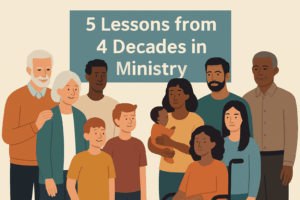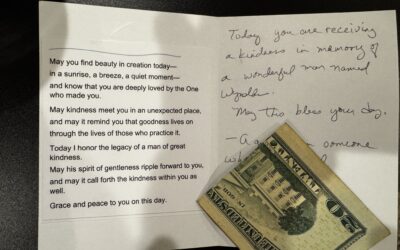Ministry is not easy. It can be a sacred calling that helps others draw near to God, or it can become a stumbling block for both ministers and those they serve. After more than forty years in full-time ministry, I’ve come to realize that some lessons are too important not to share. I’ve made mistakes along the way, and for any of those I’ve recognized or had pointed out, I offer my sincere apologies. I hope I’ve learned from them. And I continue to learn from the things that have proven deeply helpful. Here are five crucial things, among many others, that I’ve learned. We certainly weren’t perfect or anywhere close to it, but as I look back, both in appreciation for my late husband and our shared and personal convictions, these convictions seem important. While they may seem basic, too often they are neglected or forgotten. 
- Motivation Matters
Some brief overview through the decades: From my early teen years, I felt a longing/calling to do something that could truly change lives, something that connected people to God.
Back then, the prevailing mindset was that the only path for a woman into ministry was to marry a minister. I would have married Wyndham no matter his profession, but it was a gift of grace that our paths aligned. Ironically, I met him through my boyfriend at the time, who invited him to church. God has a sense of humor.
We were passionate about sharing Jesus, beginning with our early years in campus ministry. This motivated us; it certainly wasn’t the occupational perks. Our income in the first five years of marriage was less than $10,000 annually, which was challenging even then. Our furniture included a kitchen table made from an electrical spool and a roadside-found bed (yes, that is disgustingly true). I even built our sofa out of 2x4s, stuffing and sewing the cushions myself. And yet, I treasure those years. No one questioned our motivation, as it was clear we were doing this because we loved God and people. I took odd jobs as a church secretary and a house cleaner to supplement our income, along with working hard in the ministry. We had our children during that time, and for all but one birth, we didn’t have insurance. Somehow, God provided. Motivation matters. I’m grateful that over time, women working in ministry began to be paid and resources significantly improved, adding insurance and retirement benefits. This allows me to live as a retired widow today, something I don’t take for granted.
The next decade brought joys and challenges. Old and new wineskins didn’t always mix. After several “invitations to leave,” we helped plant a church in Charlotte with 13 people (including us), who pooled resources to bring our family of four (not knowing I was pregnant with our third). We lived with another family for a while, and though it was hard, it was a beautiful time of faith and friendship. Motivation matters. I’m not advocating this financial plan, but it taught us a lot.
When we moved to Boston in 1987, the plan was to eventually go on the mission field. As a 13-year-old, when I was baptized, I had strangely “counted the cost” with myself, asking if I’d remain faithful even if a gun were held to my head, or if I was called to Africa. Thankfully, no gun came to my head, but a knife once came to my back (quite the frightening and faith-building story), and we were indeed asked to go to Africa. Ultimately, those plans were changed for us, and we were instead asked to stay in Boston, where Wyndham became an elder in his late thirties. After all, we were needed as “older” members of the church, being in our mid-to-late thirties!
It was a thrilling time as the gospel spread across the globe, but by the turn of the century, things changed. Leadership models became centralized and unhealthy. We even considered leaving, but stayed through the firestorm that began needed changes. We loved our church family, and I’ve not stopped.
Eight years before the firestorm, we were assigned to help with ministry to the poor and disenfranchised in Eastern Europe, while still living in Boston. The travel took a toll, but the experience was life-changing. Walking through slums and witnessing poverty firsthand reshaped me. Working on behalf of orphans and the elderly felt like following in Jesus’ steps. We eventually adopted a 12-year-old son from Romania. That season taught me much about life, adoption, trauma, and justice, deepening my motivation.
Ministry is hard, especially emotionally. It involves walking with others through their most sacred and sorrowful moments: faith challenges, marriages, sicknesses, deaths, and transitions. Without strong spiritual boundaries, it’s easy to confuse our job with being someone’s solution. But only Jesus fills that role. Advice is just advice. What sustains us is helping people find their way to him. Jesus must remain our motivation.
And even though the work never feels finished and the phone never really stops buzzing, we learned the absolute necessity of rest and renewal. Sometimes, the hard way. This life rhythm helped bring us back to Jesus, and the reason why we did what we did and do what we do. Jesus.
- Ministry Begins at Home
For us, the ministry wasn’t just a job. It was life. Sometimes that was good thinking, and sometimes it created blurred boundaries, which wasn’t helpful. Jesus was our foundation and remains my firm foundation, and ministry was simply a call within that larger life. Our marriage and our kids were not secondary—they were primary. And they knew that.
Even good families can be neglected in the name of doing good. Thus, we made intentional space for one another. We protected the dinner table and had individual times with the kids, as well as regular family nights. Our kids knew we would walk away from ministry if they ever truly needed us to.
We worked hard on emotional connection so they felt they could talk to us about anything. We tried to shield them from both entitlement and unfair scrutiny, though the latter is harder to control. We wanted them to find their identity as beloved by God and us, and that performance was not their value. Being a ministry kid can be hard, and the temptation to people-please is real, both as kids and parents. Thus, we tried hard to show them that they were deeply loved not for what they did, but for who they were. I believe if you asked them, they would concur. Nothing can take away our love for them.
- Posture is Everything
What is posture? It’s a mindset. A way of thinking. When I think about posture, I think of Jesus, towel in hand, kneeling to wash his disciples’ feet. That’s the image we wanted to carry into the ministry, and it’s hard to stay in that position. While all personality types are equally needed and valuable, from the prophetic voices that call us higher, to the teacher types who take us deeper, to those more in tune with injustice who take us wider, the posture of humility and service, towel in hand, is always crucial—because this is the Jesus way.
We chose not to introduce ourselves or explain our roles as leading a church, instead choosing to say we serve the church. Somehow, that mattered and helped keep motivation purer. Whenever we began working with a new ministry, we met with each small group over a shared meal to learn their stories. We wanted to understand their needs and discover how we could best serve the church family alongside them. This ensured they were not projects, but equal, fellow disciples created in the image of God.
- Stay Connected
We consistently, no matter our role, made sure we were part of a small “family group” and encouraged every church leader to keep this connection as their primary connection. That was our core church family, the place we belonged, listened, and learned. It grounded us in the everyday lives of others. Ministers who aren’t in a small group can too easily lose sight of the real needs, hopes, and hurts of the people they serve. This was a deep conviction my husband held, and it’s a good one I carry.
We kept several close friends in our lives with whom we consistently shared our disappointments, victories, weaknesses, sins…to gain courage and strength from one another. We also tried to be vulnerable with those we were training. We can learn from everyone, and this helped to make the friendship one of mutuality, still shared with many today, decades later.
We also practiced weekly, purposeful hospitality. It took planning, but one night a week was dedicated to opening our table for a shared meal. Sometimes it was for friends we were reaching out to—neighbors who often became dear friends and, in many cases, fellow believers. Often, it was for people who had left the church. We listened to them and did our best to offer healing where we could.
- Keep Growing
It’s easy while in ministry to become too busy to keep learning, but we must remain curious. Read widely. Ask questions. Be and stay humble. Don’t assume you have all the answers. Rely on the Spirit, not self. This is hard when we become “good” at certain aspects of ministry, and it can become a “well-oiled, self-reliant” job.
We must also engage with voices outside our own church stream. I’ve heard some say that theological training waters down evangelism. I’ve found the opposite. We’ve too often built ministry on faulty assumptions and underdeveloped biblical understandings because of a lack of biblical training.
Emotional healing is crucial. Ministry is not the right profession for someone carrying significant unresolved wounds and trauma, thus remaining full of unresolved, unmet needs that require high maintenance. Often, others are more aware of such than the person carrying them, and I have observed this far too often. We must do the work to become emotionally whole, but that usually does not combine well with full-time ministry. Ministry can’t define identity, and too often it does. There is a reason people in the Bible spent significant time in “the wilderness” before they began their ministry. God works on us, and we do work as well. Ministry must flow from who we are, not to make us someone. Hurt people hurt people.
These are just five lessons. There are many more. But if you’re in the full-time ministry, or considering it, I hope these thoughts will strengthen your spirit and encourage your soul. No matter who you are in God’s family, keep growing and learning, motivated by Jesus, loving your family, humbly serving and connecting….remembering that Jesus is our true motivation. As has become my habit of late, I close with a blessing for you.
May your love for Jesus remain your truest motivation,
deeper than duty, open to criticism, impervious to applause.
And when the work is never finished,
may you find your rest in him.
May your posture mirror our Lord
who knelt with towel in hand,
and may your heart stay soft
even when your hands grow weary.
May you stay relationally rooted —
with friendships that share tears,
ask questions,
and speak truth with love.
And may you never stop growing—
in wisdom, in courage,
and in the joy of knowing
that Jesus is enough.
Amen



So beautifully written and expressed Jeanie! Thank you for sharing your heart so powerfully and with wise insight.
Loved this! Made things easier to understand. Helped me know you and Wyndham better also. Love you both sooo much!
Thank you, Doreen. Sneding much love.
Thank you, Debbie. Today, I am seeing comments that were hidden to me. Thank you for your encouragement! Sending love.
Jeanie, your love for Jesus made a life changing impact on me. Thank you is not sufficient.
Katherine. How wonderful to hear from you,and I thank you for your kind words and remembrances. Those were truly special times…very dear to me. Sending so much love to you and Phil. I wish I knew your beautiful family.